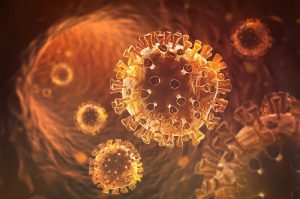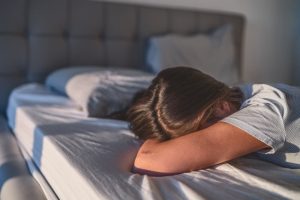Posted on Tuesday, November 1st, 2022 at 7:04 pm
Many people reported changes to their sleeping patterns when the COVID-19 pandemic started, especially during the lockdowns. With surges in infections and the development of new variants, reports of sleeping problems are occurring again.
Some people have noticed symptoms of insomnia. They struggle to fall asleep or stay asleep. Others say they feel like they don’t get enough sleep and experience chronic fatigue.
Sleep and the Immune System

Poor sleep can affect how the immune system functions. Immune function can also impact sleep. Cytokine production increases during sleep, especially when someone is in a deep stage of sleep. Getting a good night’s sleep benefits the immune response. It increases the chance of surviving when a virus invades the body.
Effects of COVID on Sleeping Patterns
Researchers are still studying and learning about the impact COVID-19 has on sleep. However, they already know the effects of other viral infections on sleeping patterns.
A study published by the National Library of Medicine shows that the common cold causes psychomotor vigilance impairment. That means it can disrupt sleep, leading to reduced sleep efficiency, decreased total sleep time, and lowered consolidated sleep.
The National Library of Medicine published another study on sleep patterns in people with COVID-19 and the differences between them and those without the infection. The participants reported more sleep time but increased disruptions while sleeping. They also noticed poorer sleep quality, more restless sleep, and increased trouble falling asleep.
Long COVID and Chronic Insomnia

Taking more naps during the day can also result in sleeping poorly at night. Although napping is beneficial under appropriate circumstances, it can negatively affect sleep quality at night.
Multiple factors alone or combined can cause insomnia symptoms when someone has COVID. Typically, short-term insomnia doesn’t lead to significant problems. However, persistent sleeping issues can cause chronic insomnia.
People with long COVID might get sufficient sleep but always feel fatigued long after recovering from the infection. Determining why fatigue might linger after a viral infection requires further research, but an excessive immune response could be a contributing factor.
Is There a Link Between COVID and Sleep Apnea?
Cardiovascular Diabetology published a study on the possible link between sleep apnea and COVID. The research suggests an increased risk of COVID-19 in people with sleep apnea. However, the study didn’t involve diverse participants. Everyone had type 2 diabetes.
A risk factor for severe COVID-19 might be obstructive sleep apnea. People with diabetes, a higher body mass index, and older adults are more likely to develop sleep apnea. These groups of people are also more vulnerable to severe COVID.
In a British Medical Journal study, 8.5 percent of 445 participants with COVID-19 also had obstructive sleep apnea. Of the participants, 20.9 percent had to be hospitalized. This represents a higher hospitalization rate than in people in the general population.
Despite the researchers controlling for obstructive sleep apnea risk factors, the sleeping disorder continued to be an independent risk factor for hospitalization among the participants. Those with obstructive sleep apnea had an increased risk of hospitalization for COVID regardless of pre-existing conditions, sex, age, and body mass index.
Worsening sleep apnea symptoms might occur with COVID-19. The virus can cause airway inflammation and make breathing while sleeping more challenging. A higher chance of getting long COVID might also be a risk for people with mild obstructive sleep apnea.
What Is Sleep Apnea?
Sleep apnea is a sleep disorder that causes a person to stop and start breathing repeatedly while sleeping. Obstructive sleep apnea is the most common type.
The throat muscles relax, closing or narrowing the airway while breathing. The brain senses the inability to breathe, causing a person to wake up briefly to reopen their airway, disrupting their sleep cycle.
Trouble Sleeping? Contact Silent Night Therapy Today
Studies showing a possible link between COVID-19 and sleep apnea are alarming. However, you can get the treatment you need with a proper diagnosis. You should contact a Silent Night Therapy sleep specialist immediately whether you already had breathing difficulties while sleeping or noticed worse symptoms after getting COVID.
Your journey to a better night’s sleep starts with Silent Night Therapy. Call us at 631-983-2463 or take a three-minute online evaluation to determine if sleep apnea or another disorder is the culprit of your sleeping problems.
Related posts: